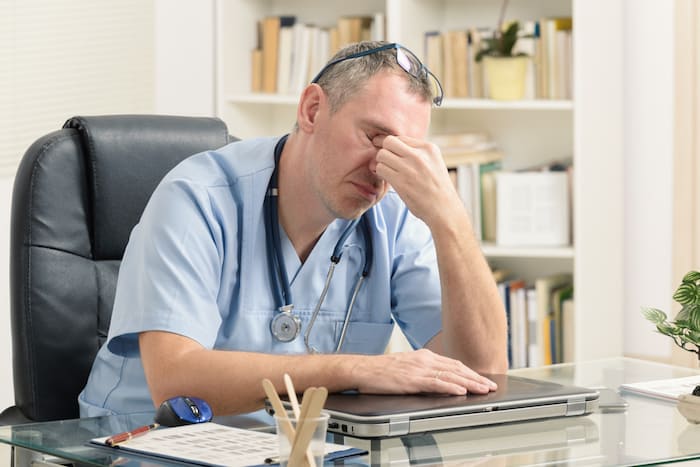Photo credit: Depositphotos
By Kelli M. Waters, LCSW, CAADC, Director of Care, Listeners On Call
As healthcare professionals we often preach to our patients the importance of self-care and managing stress. As a mental health professional, I often have to remind myself to take my own advice and to practice what I preach. That is often easier said than done. It is common for healthcare professionals to worry greatly about taking care of their mental health or taking time away, as there is concern as to how they will be perceived. A common feeling of healthcare professionals surrounding taking much needed time away is the worry of how others will perceive them; in addition to, the fear of no longer being deemed productive and/or competent.
According to a recent study conducted by the University of Minnesota’s Center for Infectious Disease Research and Policy (CIDRAP), one in five healthcare workers are experiencing significant mental health side effects from the pandemic. Healthcare workers have had to continue to provide care despite the risk of infection of themselves and their families, all while battling extreme exhaustion. Some were left with the emotionally and often ethically burdensome decision of rationing resources. With the fear of transmission, many healthcare workers had to isolate themselves for months, which contributed to increased feelings of loneliness. Ultimately the pandemic has been a breeding ground for traumatic stress.
While the pandemic has magnified the mental health side effects in healthcare workers, mental health concerns in the healthcare field have been a developing problem with little to no solution. Healthcare workers’ jobs are extremely stressful, as you are often dealing with life and death situations, which can subsequently lead to high burnout rates and emotional exhaustion. These high rates of burnout could ultimately impact patient health. A recent study published in Mayo Clinic Proceedings of Stanford University School of Medicine shows a link between burnout and the risk of medical errors. It was found that physician burnout has become a national epidemic, and that half of all doctors experience symptoms of exhaustion. The problem goes beyond overworked physicians and seems to apply across specialties.
There is a strong need for healthcare systems to take steps to acknowledge the mental health impact of caring for patients has on its employees. Most healthcare entities have checked the box in calling out that there is a problem. The difficulty has been translating that into real change. Offering resources could help employees cope before work-related stress evolves into more serious issues like depression and burnout. Destigmatizing mental health care is critical; however, these resources need to go beyond offering professional services, as there are still stigmas surrounding seeking help. Even though this is a population who is highly educated about mental health, they are not immune to the stigmas. It is common for healthcare workers to feel called into the profession and feel a desire to help others. In turn, when you have to ask for help or acknowledge that there is a problem, it often creates feelings of shame and the notion that you are unqualified to care for others if you yourself need help.
A resource that could help in minimizing work-related stress and ultimately prevent more serious issues like depression and burnout is on-demand consumer listening services. This is a way to help provide healthcare professionals and caregivers with a place to feel heard and understood in an anonymous and non-clinical setting. Being a professional healthcare worker myself, I will always be an advocate for seeking professional help; however, I am very familiar with the stigma surrounding healthcare professionals receiving mental health care. I know that often people need someone who understands what they are going through, to be listened to, and to feel validated. I repeatedly see individuals who are in crisis mode and have unfortunately gotten to a point where they cannot function anymore. Having a person to speak to before reaching a crisis point and talking to someone when you first start to recognize signs of stress, could be life altering.
Healthcare workers having access to a listening service could help to prevent an individual getting to that crisis point. Listening services give increased access to empathy. Speaking to someone who can understand what they are personally going through can help to reduce feelings of isolation and hopelessness. Making a call could be the first step towards self-care, and subsequently a solution to a growing epidemic among the healthcare community.
Kelli Waters Egger, LCSW, CAADC is Director of Care for Listeners On Call where she oversees and guides the care program. She believes in the power of human connection; connection has the power to not only reduce anxiety and depression, but helps to regulate emotions, and improve overall self-worth. Her experience as a licensed clinical social worker and addiction counselor has helped prepare her for the role of Director of Care.
Kelli has a true passion for helping others and throughout her career, she has worked in the nonprofit sector, outpatient settings, hospice, home health, the federal and state court system, and Telehealth. She has worked with children, families, and individuals as an agent of support and guidance. Her experiences as an empathetic Listener over the years, serves as her foundation for supporting the Listeners On Call team.
Kelli lives in Dallas with her husband Cole — co-founder for Listeners On Call.
The Editorial Team at Healthcare Business Today is made up of skilled healthcare writers and experts, led by our managing editor, Daniel Casciato, who has over 25 years of experience in healthcare writing. Since 1998, we have produced compelling and informative content for numerous publications, establishing ourselves as a trusted resource for health and wellness information. We offer readers access to fresh health, medicine, science, and technology developments and the latest in patient news, emphasizing how these developments affect our lives.








